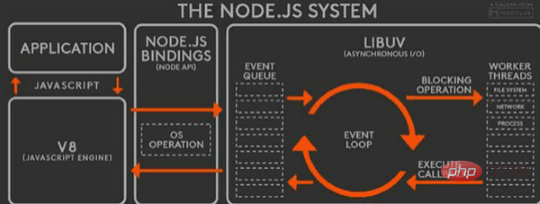
前言
Node目前处境稍显尴尬,很多语言都已经拥有异步非阻塞的能力。阿里的思路是比较合适的,但是必须要注意,绝对不能让node做太多的业务逻辑,他只适合接收生成好的数据,然后或渲染后,或直接发送到客户端。
为什么nodejs 还可以成为主流技术哪?
是因为nodejs 对于大前端来说还是非常重要的技术!!!如果你理解nodejs 的编程原理,很容易就会理解angularjs,reactjs 和vuejs 的设计原理。
NodeJS
Node是一个服务器端JavaScript解释器,用于方便地搭建响应速度快、易于扩展的网络应用。Node使用事件驱动,非阻塞I/O 模型而得以轻量和高效,非常适合在分布式设备上运行数据密集型的实时应用。
Node是一个可以让JavaScript运行在浏览器之外的平台。它实现了诸如文件系统、模块、包、操作系统 API、网络通信等Core JavaScript没有或者不完善的功能。历史上将JavaScript移植到浏览器外的计划不止一个,但Node.js 是最出色的一个。
相关推荐:《nodejs 教程》
V8引擎
V8 JavaScript引擎是Google用于其Chrome浏览器的底层JavaScript引擎。很少有人考虑JavaScript在客户机上实际做了些什么!
实际上,JavaScript引擎负责解释并执行代码。Google使用V8创建了一个用C++编写的超快解释器,该解释器拥有另一个独特特征;您可以下载该引擎并将其嵌入任何应用程序。V8 JavaScript引擎并不仅限于在一个浏览器中运行。
因此,Node实际上会使用Google编写的V8 JavaScript引擎,并将其重建为可在服务器上使用。
事件驱动
在我们使用Java,PHP等语言实现编程的时候,我们面向对象编程是完美的编程设计,这使得他们对其他编程方法不屑一顾。却不知大名鼎鼎Node使用的却是事件驱动编程的思想。那什么是事件驱动编程。
事件驱动编程,为需要处理的事件编写相应的事件处理程序。代码在事件发生时执行。
为需要处理的事件编写相应的事件处理程序。要理解事件驱动和程序,就需要与非事件驱动的程序进行比较。实际上,现代的程序大多是事件驱动的,比如多线程的程序,肯定是事件驱动的。早期则存在许多非事件驱动的程序,这样的程序,在需要等待某个条件触发时,会不断地检查这个条件,直到条件满足,这是很浪费cpu时间的。而事件驱动的程序,则有机会释放cpu从而进入睡眠态(注意是有机会,当然程序也可自行决定不释放cpu),当事件触发时被操作系统唤醒,这样就能更加有效地使用cpu。
来看一张简单的事件驱动模型(uml):
事件驱动模型主要包含3个对象:事件源、事件和事件处理程序。
事件源:产生事件的地方(html元素)
事件:点击/鼠标操作/键盘操作等等
事件对象:当某个事件发生时,可能会产生一个事件对象,该时间对象会封装好该时间的信息,传递给事件处理程序
事件处理程序:响应用户事件的代码
运行原理
当我们搜索Node.js时,夺眶而出的关键字就是 “单线程,异步I/O,事件驱动”,应用程序的请求过程可以分为俩个部分:CPU运算和I/O读写,CPU计算速度通常远高于磁盘读写速度,这就导致CPU运算已经完成,但是不得不等待磁盘I/O任务完成之后再继续接下来的业务。
所以I/O才是应用程序的瓶颈所在,在I/O密集型业务中,假设请求需要100ms来完成,其中99ms化在I/O上。如果需要优化应用程序,让他能同时处理更多的请求,我们会采用多线程,同时开启100个、1000个线程来提高我们请求处理,当然这也是一种可观的方案。
但是由于一个CPU核心在一个时刻只能做一件事情,操作系统只能通过将CPU切分为时间片的方法,让线程可以较为均匀的使用CPU资源。但操作系统在内核切换线程的同时也要切换线程的上线文,当线程数量过多时,时间将会被消耗在上下文切换中。所以在大并发时,多线程结构还是无法做到强大的伸缩性。
那么是否可以另辟蹊径呢?!我们先来看看单线程,《深入浅出Node》一书提到 “单线程的最大好处,是不用像多线程编程那样处处在意状态的同步问题,这里没有死锁的存在,也没有线程上下文切换所带来的性能上的开销”,那么一个线程一次只能处理一个请求岂不是无稽之谈,先让我们看张图:

Node.js的单线程并不是真正的单线程,只是开启了单个线程进行业务处理(cpu的运算),同时开启了其他线程专门处理I/O。当一个指令到达主线程,主线程发现有I/O之后,直接把这个事件传给I/O线程,不会等待I/O结束后,再去处理下面的业务,而是拿到一个状态后立即往下走,这就是“单线程”、“异步I/O”。
I/O操作完之后呢?Node.js的I/O 处理完之后会有一个回调事件,这个事件会放在一个事件处理队列里头,在进程启动时node会创建一个类似于While(true)的循环,它的每一次轮询都会去查看是否有事件需要处理,是否有事件关联的回调函数需要处理,如果有就处理,然后加入下一个轮询,如果没有就退出进程,这就是所谓的“事件驱动”。这也从Node的角度解释了什么是”事件驱动”。
在node.js中,事件主要来源于网络请求,文件I/O等,根据事件的不同对观察者进行了分类,有文件I/O观察者,网络I/O观察者。事件驱动是一个典型的生产者/消费者模型,请求到达观察者那里,事件循环从观察者进行消费,主线程就可以马不停蹄的只关注业务不用再去进行I/O等待。
优点
Node 公开宣称的目标是 “旨在提供一种简单的构建可伸缩网络程序的方法”。我们来看一个简单的例子,在 Java和 PHP 这类语言中,每个连接都会生成一个新线程,每个新线程可能需要 2 MB 的配套内存。在一个拥有 8 GB RAM 的系统上,理论上最大的并发连接数量是 4,000 个用户。随着您的客户群的增长,如果希望您的 Web 应用程序支持更多用户,那么,您必须添加更多服务器。所以在传统的后台开发中,整个 Web 应用程序架构(包括流量、处理器速度和内存速度)中的瓶颈是:服务器能够处理的并发连接的最大数量。这个不同的架构承载的并发数量是不一致的。
而Node的出现就是为了解决这个问题:更改连接到服务器的方式。在Node 声称它不允许使用锁,它不会直接阻塞 I/O 调用。Node在每个连接发射一个在 Node 引擎的进程中运行的事件,而不是为每个连接生成一个新的 OS 线程(并为其分配一些配套内存)。
缺点
如上所述,nodejs的机制是单线程,这个线程里面,有一个事件循环机制,处理所有的请求。在事件处理过程中,它会智能地将一些涉及到IO、网络通信等耗时比较长的操作,交由worker threads去执行,执行完了再回调,这就是所谓的异步IO非阻塞吧。但是,那些非IO操作,只用CPU计算的操作,它就自己扛了,比如算什么斐波那契数列之类。它是单线程,这些自己扛的任务要一个接着一个地完成,前面那个没完成,后面的只能干等。因此,对CPU要求比较高的CPU密集型任务多的话,就有可能会造成号称高性能,适合高并发的node.js服务器反应缓慢。
适合场景
1、RESTful API
这是适合 Node 的理想情况,因为您可以构建它来处理数万条连接。它仍然不需要大量逻辑;它本质上只是从某个数据库中查找一些值并将它们组成一个响应。由于响应是少量文本,入站请求也是少量的文本,因此流量不高,一台机器甚至也可以处理最繁忙的公司的 API 需求。
2、实时程序
比如聊天服务
聊天应用程序是最能体现 Node.js 优点的例子:轻量级、高流量并且能良好的应对跨平台设备上运行密集型数据(虽然计算能力低)。同时,聊天也是一个非常值得学习的用例,因为它很简单,并且涵盖了目前为止一个典型的 Node.js 会用到的大部分解决方案。
3、单页APP
ajax很多。现在单页的机制似乎很流行,比如phonegap做出来的APP,一个页面包打天下的例子比比皆是。
总而言之,NodeJS适合运用在高并发、I/O密集、少量业务逻辑的场景
更多编程相关知识,请访问:编程入门!!
The above is the detailed content of 了解Nodejs及其运行原理. For more information, please follow other related articles on the PHP Chinese website!
 From Websites to Apps: The Diverse Applications of JavaScriptApr 22, 2025 am 12:02 AM
From Websites to Apps: The Diverse Applications of JavaScriptApr 22, 2025 am 12:02 AMJavaScript is widely used in websites, mobile applications, desktop applications and server-side programming. 1) In website development, JavaScript operates DOM together with HTML and CSS to achieve dynamic effects and supports frameworks such as jQuery and React. 2) Through ReactNative and Ionic, JavaScript is used to develop cross-platform mobile applications. 3) The Electron framework enables JavaScript to build desktop applications. 4) Node.js allows JavaScript to run on the server side and supports high concurrent requests.
 Python vs. JavaScript: Use Cases and Applications ComparedApr 21, 2025 am 12:01 AM
Python vs. JavaScript: Use Cases and Applications ComparedApr 21, 2025 am 12:01 AMPython is more suitable for data science and automation, while JavaScript is more suitable for front-end and full-stack development. 1. Python performs well in data science and machine learning, using libraries such as NumPy and Pandas for data processing and modeling. 2. Python is concise and efficient in automation and scripting. 3. JavaScript is indispensable in front-end development and is used to build dynamic web pages and single-page applications. 4. JavaScript plays a role in back-end development through Node.js and supports full-stack development.
 The Role of C/C in JavaScript Interpreters and CompilersApr 20, 2025 am 12:01 AM
The Role of C/C in JavaScript Interpreters and CompilersApr 20, 2025 am 12:01 AMC and C play a vital role in the JavaScript engine, mainly used to implement interpreters and JIT compilers. 1) C is used to parse JavaScript source code and generate an abstract syntax tree. 2) C is responsible for generating and executing bytecode. 3) C implements the JIT compiler, optimizes and compiles hot-spot code at runtime, and significantly improves the execution efficiency of JavaScript.
 JavaScript in Action: Real-World Examples and ProjectsApr 19, 2025 am 12:13 AM
JavaScript in Action: Real-World Examples and ProjectsApr 19, 2025 am 12:13 AMJavaScript's application in the real world includes front-end and back-end development. 1) Display front-end applications by building a TODO list application, involving DOM operations and event processing. 2) Build RESTfulAPI through Node.js and Express to demonstrate back-end applications.
 JavaScript and the Web: Core Functionality and Use CasesApr 18, 2025 am 12:19 AM
JavaScript and the Web: Core Functionality and Use CasesApr 18, 2025 am 12:19 AMThe main uses of JavaScript in web development include client interaction, form verification and asynchronous communication. 1) Dynamic content update and user interaction through DOM operations; 2) Client verification is carried out before the user submits data to improve the user experience; 3) Refreshless communication with the server is achieved through AJAX technology.
 Understanding the JavaScript Engine: Implementation DetailsApr 17, 2025 am 12:05 AM
Understanding the JavaScript Engine: Implementation DetailsApr 17, 2025 am 12:05 AMUnderstanding how JavaScript engine works internally is important to developers because it helps write more efficient code and understand performance bottlenecks and optimization strategies. 1) The engine's workflow includes three stages: parsing, compiling and execution; 2) During the execution process, the engine will perform dynamic optimization, such as inline cache and hidden classes; 3) Best practices include avoiding global variables, optimizing loops, using const and lets, and avoiding excessive use of closures.
 Python vs. JavaScript: The Learning Curve and Ease of UseApr 16, 2025 am 12:12 AM
Python vs. JavaScript: The Learning Curve and Ease of UseApr 16, 2025 am 12:12 AMPython is more suitable for beginners, with a smooth learning curve and concise syntax; JavaScript is suitable for front-end development, with a steep learning curve and flexible syntax. 1. Python syntax is intuitive and suitable for data science and back-end development. 2. JavaScript is flexible and widely used in front-end and server-side programming.
 Python vs. JavaScript: Community, Libraries, and ResourcesApr 15, 2025 am 12:16 AM
Python vs. JavaScript: Community, Libraries, and ResourcesApr 15, 2025 am 12:16 AMPython and JavaScript have their own advantages and disadvantages in terms of community, libraries and resources. 1) The Python community is friendly and suitable for beginners, but the front-end development resources are not as rich as JavaScript. 2) Python is powerful in data science and machine learning libraries, while JavaScript is better in front-end development libraries and frameworks. 3) Both have rich learning resources, but Python is suitable for starting with official documents, while JavaScript is better with MDNWebDocs. The choice should be based on project needs and personal interests.


Hot AI Tools

Undresser.AI Undress
AI-powered app for creating realistic nude photos

AI Clothes Remover
Online AI tool for removing clothes from photos.

Undress AI Tool
Undress images for free

Clothoff.io
AI clothes remover

Video Face Swap
Swap faces in any video effortlessly with our completely free AI face swap tool!

Hot Article

Hot Tools

MantisBT
Mantis is an easy-to-deploy web-based defect tracking tool designed to aid in product defect tracking. It requires PHP, MySQL and a web server. Check out our demo and hosting services.

Dreamweaver Mac version
Visual web development tools

SublimeText3 Mac version
God-level code editing software (SublimeText3)

PhpStorm Mac version
The latest (2018.2.1) professional PHP integrated development tool

WebStorm Mac version
Useful JavaScript development tools





